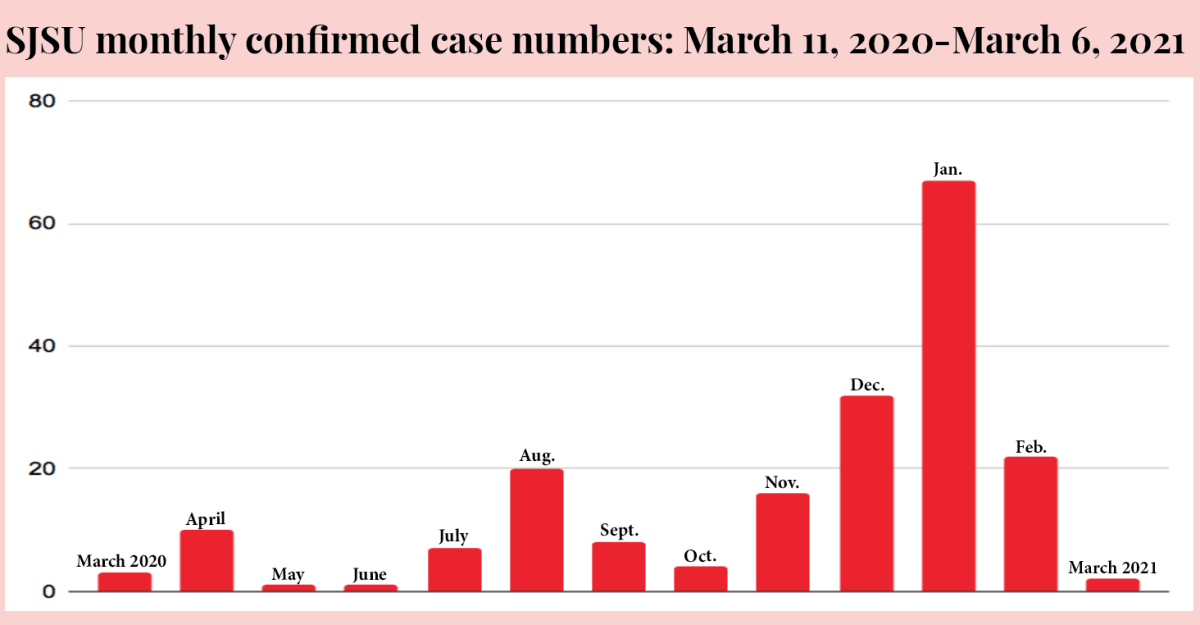
Infographic by Bryanna Bartlett, Source Dr. Barbara Fu
During a Wednesday town hall San Jose State University officials announced plans for Fall 2021, including making the coronavirus vaccine optional for students and faculty and adding more personal protective equipment (PPE) on campus.
While vaccinations will be encouraged, returning students and faculty won’t be required to get the COVID-19 vaccine and the number of SJSU community members who are vaccinated won’t be tracked, university officials said.
“We’re in a much more optimistic place in many regards than we were before,” Vincent Del Casino Jr., provost and senior vice president of academic affairs said during the town hall. “[We’re] hoping that the vaccine will take effect, that more people have access to that sort of medical opportunity.”
Dr. Barbara Fu, the SJSU Student Wellness Center medical director, said the university saw a surge of more than 60 confirmed COVID-19 cases among students, faculty and staff in January.
During the town hall, Fu said of the 195 confirmed cases the university has reported over the last year, 80% were students as of Saturday.
Resuming face-to-face classes
Del Casino said university officials are optimistic about the fall semester and the return of “many” faculty and students to on-campus classes.
He said there will be hybrid classes that meet both in-person and online, and a higher number of online courses will be offered for fall semester to accommodate students.
While the university aims to have classes mostly in person, Del Casino said the decision is tentative.
”I only say hope because there’s potential for unforeseen things if, for example, there’s a new surge in the pandemic, we may have to change course,” Del Casino said.
He also said he hopes the class offerings available when priority registration begins reflect what university officials have planned for Fall 2021.
Joanne Wright, senior associate vice president of university personnel, said whether or not faculty members can work on campus will depend on what is required by the university.
“For certain positions, it may very well be required to return to campus,” Wright said during the town hall. “There are employees on campus now supporting what we needed this time, which is for a limited campus population and extremely limited in-person classes.”
SJSU resources to reopen
Patrick Day, vice president for student affairs, said students and faculty can expect pre-coronavirus activities such as athletics and recreational activities to resume on a much smaller scale.
He also said amenities including the Dr. Martin Luther King Jr. Library and the Diaz Compean Student Union are scheduled to reopen.
Day said there are expected to be more in-person student success centers, but many will likely continue to be offered online.
“For some students [online services] has actually worked really well and even better, from a scheduling perspective,” Day said in the town hall.
Design studies sophomore Britney Pickering said she found the reopening of the Student Union dining area questionable.
“I guess the student union is kind of like a mall in a sense, especially with the food court,” Pickering said in a phone call. “I don’t really think of it as the first thing to reopen, especially the food area is what I’m trying to get at.”
Personal protective equipment on campus
Traci Ferdolage, senior associate vice president of facilities, development and operations, said the university will adhere to the SJSU Adapt Plan in order to ensure the safety of the campus community.
“The adapt plan will continue to evolve based on changing conditions and requirements as well as our campus repopulation plan for Fall 2021,” Ferdolage said at the town hall.
The SJSU Adapt Plan is a four-phase projection of campus reopening, with phase one being a completely online learning environment and phase four a complete on-campus return. The university is currently in phase two of the plan, according to SJSU Health Advisories.
Ferdolage said university personnel will continue to disinfect areas that are frequently touched, but cleaning between in-person classes will be a struggle.
“It’s going to be challenging to provide cleaning between classes because of how course schedules are and the amount of time between them as well as just some of the informal use,” Ferdolage said. “We anticipate it’s going to happen as students try to find a place to sit and to take another class.”
Campus members can expect more personal protective equipment stations placed throughout campus as more people return to the university.
“Those stations will contain face coverings, gloves and hand sanitizer, we’ll place them strategically throughout the campus,” Ferdolage said.